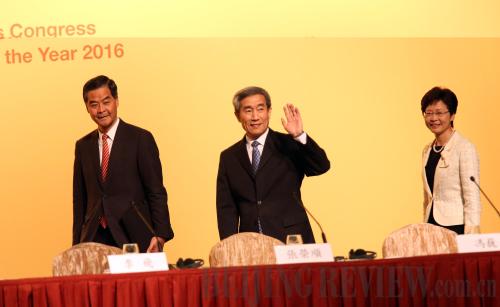

INTRODUCING UNIVERSAL SUFFRAGE: Li Fei (right), Vice Secretary General of the National People's Congress (NPC) Standing Committee, and Hong Kong Chief Executive Leung Chun-ying, before a briefing session on the NPC Standing Committee's decision in Hong Kong on September 1 (CNSPHOTO)
Hong Kong's democracy is about to make another leap forward after the National People's Congress (NPC) Standing Committee decided to grant universal suffrage in the selection of Hong Kong's chief executive on the basis of nomination by a "broadly representative" committee.
The decision on how the chief executive of the Hong Kong Special Administrative Region (HKSAR) will be selected was passed unanimously at the bi-monthly session of the standing committee of China's top legislature on August 31.
The decision allows two or three candidates to run for the HKSAR's top job after obtaining support from at least half of a nominating committee that "shall be chosen in accordance with the number of members, composition and formation method of the election committee for the fourth chief executive."
According to the NPC decision, all eligible voters in the region will be able to have their say in who the chief executive for the HKSAR will be, while the existing system and voting procedures for the Legislative Council will remain unchanged. Under Hong Kong's Basic Law, it is stipulated that "all permanent residents of the HKSAR shall have the right to vote and the right to stand for election in accordance with law."
Li Fei, Vice Secretary General of the NPC Standing Committee, said during a press conference on August 31 afternoon that the size of the nominating committee was set at 1,200.
The chief executive-elect, after being selected through voting by the populace, will still need to be appointed by the Central Government, according to the decision, which stressed that the chief executive has to be a person who "loves the country and loves Hong Kong."
Li said this is a basic requirement for the "one country, two systems" policy. The method for selecting the chief executive by universal suffrage must provide corresponding institutional safeguards for this purpose.
Top Chinese legislator Zhang Dejiang also said on August 31 that the new decision was of great importance to implementing the principles of "one country, two systems" and ensuring that the region maintains a high degree of autonomy while following the Hong Kong Basic Law.
"The decision is vital for steadily developing democracy in Hong Kong and implementing the selection of the HKSAR chief executive by universal suffrage according to law," he said.
Britain made no mention of democracy for Hong Kong until the dying days of nearly 150 years of colonial rule. Before Hong Kong was returned to China on July 1, 1997, the Governors of Hong Kong were all appointed by the British Crown, without recourse to any pretense of democracy.
A milestone
The first chief executive of the HKSAR was elected by a 400-member selection committee in early 1997, while the second, third and fourth chief executives were elected by an election committee, the membership of which had grown from 800 to 1,200 in the meantime.
In December 2007, the NPC Standing Committee resolved that the election of Hong Kong's fifth chief executive in 2017 may be implemented by the method of universal suffrage.
The latest decision said that "implementing universal suffrage represents historic progress in Hong Kong's democratic development and a significant change in the political structure of the HKSAR."
Speaking during the press conference on August 31, Li said the NPC Standing Committee's decision marked a "key moment" in Hong Kong's democratic development and is crucial to its current and future stability, as well as the fundamental interests of Hong Kong residents and foreign investors.
"Hong Kong has accomplished democratic progress it never enjoyed under the British rule of over 150 years," said Chen Zuo'er, head of the Chinese Association of Hong Kong and Macao Studies. "I should congratulate the Hong Kong people today for being so close to universal suffrage."
Copyright ©1999-2018
Chinanews.com. All rights reserved.
Reproduction in whole or in part without permission is prohibited.